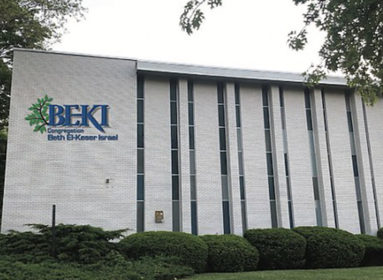In last week’s issue, the Ledger introduced “The Family Business: The Next Generation,” a new exhibition at the Sherman Museum of Jewish Civilization at the University of Hartford that focuses on seven local Jewish family businesses. The exhibition, coordinated by the university’s Greenberg Center for Judaic Studies, Barney school of Business and Entrepreneurial Center, kicked off with a symposium on Nov. 9 and will be on display through Feb. 13. The Ledger examined three of the seven businesses in part one of its coverage; this week, we continue with a look at the remaining four family businesses featured in the exhibit.
~~~~~~~~~~~~~~~~~~~~~~~~~~~~~~~~~~~~~~~~~~~~~~~~~~~~~~~~~
Message Center Management, Inc.
In 1960, Henry Zachs founded Message Center Telephone Answering Service in Hartford, after earning an MBA from the Wharton School of the University of Pennsylvania. A year later, he received his first mobile telephone license (the precursor to modern-day cellular service) and in 1970 received his first paging license. Zachs served as CEO of Message Center Beepers until 1995, when the company was sold to Airtouch (Vodafone) in the largest transaction for a private paging company. Today, Zachs serves as the president of Zafa Towers, LLC, and chief executive officer of Message Center Management.
Henry’s son, Eric Zachs, joined Message Center Beepers in 1989 when the company had 35,000 pagers. As COO, Eric revamped sales and customer service and launched Ready Beeper, the first retail-paging offering in the U.S. Under his guidance, the business grew to 350,000 units in 1995.
In 1993, Henry and Eric co-founded Message Center Management, Inc., a cellular tower business. Today, Message Center Management, Inc. is one of the nation’s leading providers of wireless communication antenna sites and serves as a complete resource for wireless antenna sites.
In 1995, Eric founded ZipLink Inc. with the mission to be the industry leader in providing wholesale Internet connectivity solutions to the business-to-business marketplace. In 2004, he formed and remains managing partner of Bantry Bay Ventures-Asia, a private equity firm focusing on China and Vietnam.
Most recently, Henry and Eric combined their wireless and international experience and co-founded Torrecom Partners, LLC, a Latin American cell tower company focused on Mexico, Central America, and Chile.
Among his extensive community involvement, Henry Zachs has served as president of the Jewish Federation of Greater Hartford, and is currently a director or trustee of several organizations, including Connecticut Institute for the Blind, Connecticut Historical Society, Ados Israel Synagogue, The Wadsworth Atheneum, Hebrew High School of New England, Solomon Schechter Day School of Greater Hartford, Jewish Federation of Greater Hartford, The Bushnell Center for the Performing Arts, and the Hillels of Trinity College, University of Hartford, and UConn. He has helped fund the Zachs Hillel House at Trinity and the newly built Trachten-Zachs Hillel House at the University of Connecticut. The West Hartford campus on which Hebrew Health Care, the Mandell JCC, and the new Community Services Building of the Jewish Federation of Greater Hartford, was renamed the Zachs Campus in recognition of the Zachs family’s generous gift to the Jewish Federation of Greater Hartford Community Capital Campaign, which Zachs co-chaired. For several years, Zachs has led the Association of Jewish Cemeteries of Greater Hartford, which works to provide proper care and ongoing maintenance in perpetuity to Jewish cemeteries.
“My motivation comes from seeing what other Jewish families have done philanthropically, both in the Jewish and non-Jewish communities,” Zachs says. “Jews need to support fellow Jews, but you also need to support your community. I feel that you can’t take it with you so you have to give back and set an example for your children and grandchildren.”
Zachs established a fund to support the Greenberg Center, and recently invested in the new Kassow Kosher Eatery, now in development at Trinity College.
Eric Zachs and his wife Jessica have also continued in this philanthropic tradition. Zachs has served as president of the Mandell JCC of Greater Hartford and the Hartford Dispensary, which provides substance-abuse care for the indigent, where he has served on the board for 20 years. He is the regional chair of the Anti-Defamation League and serves on the boards of the St. Francis Hospital Foundation, Jewish Federation of Greater Hartford, and Solomon Schechter Day School of Greater Hartford, among other organizations. Though they choose their own charitable causes, they share Henry’s philosophy. “We firmly believe that we’re part of a community, but also that the Jews have to do for the Jews,” Eric says.
Henry Zachs received the Harold Grinspoon Award for Excellence in Jewish Education Lay Leader Award in 2009. In 2008, the National Conference for Community and Justice awarded Zachs its Human Relations Award. In 2008, the Zachs family received the ADL Torch of Liberty Award.
~~~~~~~~~~~~~~~~~~~~~~~~~~~~~~~~~~~~~~~~~~~~~~~~~~~~~~~~~
The Simon Konover Company
One of seven children, Simon Konover was born in 1922 in Makow Mazowiecki, a shtetl in the Warsaw province of Poland. When he was 16, the Germans arrived. He was conscripted for forced labor, and after two weeks was sent to a labor farm. He escaped and made his way to the Russian side, where he reunited with an older brother, Harold. In June 1941, the Germans invaded the Soviet Union and Simon and his brother fled to Stalingrad, where he was conscripted to fight in the Red Army.
When the war was over he and his brother made their way to Paris. His brother David Konover, who had emigrated to Hartford during the Depression, helped the two secure passage to the U.S. David owned a flooring company and put Simon to work. Simon rose through the ranks, becoming a supervisor and starting his own development company in West Hartford.
One of the most successful real estate businesses in the U.S., The Simon Konover Company has developed, constructed, owned, and operated commercial and residential properties throughout the mid-west and eastern portions of the country.
Konover has incorporated philanthropy into his business since its inception, and established a foundation to provide for charitable giving.
“If I am able to make more money, I’ll be able to give more away,” he says. “My philosophy comes from my father and mother and family. When I left home to run away from the Nazis, the last words my father said were, ‘Simon, remember who you are and where you come from.’ Those few words meant a lot – I knew he meant to be good, to help where you can and be charitable and nice. That’s how he lived his life. We didn’t have much money but when a stranger would come to our house, my father would invite him to eat with us and give him a place to sleep, or spend the Sabbath with us. He helped start a Hebrew school. He was always involved in helping other people.”
Simon and his wife Doris are founders of the United States Holocaust Memorial Museum in Washington, D.C. They are founding supporters of the University of Connecticut Center for Judaic Studies and Contemporary Jewish Life. Simon worked with the late actor Paul Newman, donating construction services to build the Hole in the Wall Gang Camp in Ashford, for children with serious illnesses and their families. This year saw the opening of Jordan River Village, a Hole in the Wall Gang camp in Israel, which the Konovers helped finance. He is a past president of the Jewish Federation of Greater Hartford. The Konovers built the first group home for the Jewish Association for Community Living in West Hartford, and have supported nursing programs at three Hartford-area hospitals.
Simon and Doris were involved in the Greenberg Center from the very beginning, Coppa says. They set up one of the early endowments for the center.
Konover says that he began by supporting Jewish philanthropies first, and then expanded his giving as he made more money. “It all started with my Jewish identity and with the mistreatment I felt in Poland,” he says. “I had friends who would say that if something was going on, we shouldn’t mix in, but should stay out of it. But I think we should mix in and be involved and I teach my children to also be involved.”
Konover has passed down his business and philanthropic sensibilities to his three children, all of whom work in real estate. Steven Konover and Jane Konover Coppa serve with their father on the company’s board of directors. Coppa is also principal and CEO of the business, and her son David is CEO of Konover South, based in Florida.
Jane and Steven help administer the Konover Family Foundation and have developed philanthropic interests of their own. Jane is involved in the Association of Hole in the Wall Camps; Steven supports a research grant and Judaic studies faculty position at the University of Hartford, as well as the Hartford Jazz Society.
“My feeling today is that, no matter how much I give, I feel like I’m not doing enough,” Konover says. “It’s a feeling I’ll have for the rest of my life.”
~~~~~~~~~~~~~~~~~~~~~~~~~~~~~~~~~~~~~~~~~~~~~~~~~~~~~~~~~

The story of the Connecticut Packing Company began in 1905, when Kalman Bercowetz emigrated to the U.S. from Minsk. His nearly 400-acre farm became what is now the Copaco shopping center.
Copaco
The story of the Connecticut Packing Company began in 1905, when Kalman Bercowetz emigrated to the U.S. from Minsk and worked as a butcher in New York City’s meat-packing district.
In 1909, Bercowetz brought his wife, Rebecca Magadovitch, to their new home in Bloomfield, a nearly 400-acre farm on Cottage Grove Road in Bloomfield, where Copaco is located today. They started a family that would grow to include three sons and two daughters.
Bercowetz’s original vision of the family business developed from a need to move inventory. His small herd of dairy cattle also provided meat for the family and when he had excess beef, he would sell it to Hartford residents who traveled to Bloomfield to buy fresh meat.
During the Great Depression, with three sons seeking employment, Bercowetz used his land as collateral to borrow money and build a meat-packing plant, which he named the Connecticut Packing Company.
In 1947, Bercowetz, his three sons, and his brother-in-law, Israel Rosenthal, incorporated the Connecticut Packing Company, which now included a small retail meat company and a smokehouse and sausage kitchen.
After the Korean War, son Irving helped develop a portion of the family farm into Bloomfield’s first industrial zone, the Granby Street Industrial Park. In 1966, with funds from the Granby Street land sale, Irving and the family opened the 40,000-square-foot Copaco supermarket, then the largest store of its kind in Connecticut.
Kalman Bercowetz passed away in 1970, and several third-generation family members joined the company, including Irving’s daughter, Bonnie. In 1978, when the family failed to find desirable sites to build new stores, Copaco supermarket was expanded to nearly 80,000 square feet.
Copaco’s wholesale meat-packing facility and sausage kitchen were sold in 1983. In 1986, Irving and his partners developed a transition and succession plan that would eventually place control of the company in the hands of their children.
When frontage in the shopping center was taken by eminent domain in the 1990s for the widening of Cottage Grove Road, Bonnie convinced the second generation to reinvest in a renovation and expansion of the shopping center. When Copaco Center was sold in 2005, it included more than 500,000 square feet of national and local retailers.
Philanthropic involvement in the community and beyond was part of Copaco’s founding vision and continued to the second and third generations. Kalman Bercowetz donated land for Beth Hillel Synagogue, where he was a founding member; the Hebrew school is named in his honor. Second- and third-generation family members were active in community and charitable organizations in Bloomfield. In the ‘60s and ‘70s, Copaco funded a Little League team and offered parking-lot space for any local group running a fundraiser. The Bloomfield Citizenship Award, presented annually to a high-school senior, was created by Belle (Bercowetz) and her husband, Morris Cutler. Copaco donated the first ambulance to the Blue Hills Fire District and, for nearly 40 years, provided animal organs used for research by Pfizer and the UConn schools of agriculture, medicine, and dentistry, and at local institutions including Yale, Amherst College, Hartford Hospital, and St. Francis Hospital.
“Tzedakah was a mainstay of my grandfather Kalman and my father, and especially my mother, Millie, who were all extremely generous,” says Bonnie Bercowetz. “My mother was very active in Hadassah and the Brandeis Women’s Committee, and this concept of giving back was certainly passed on to my sisters and me.”
Irving and Millie Bercowetz were among the original donors to the Greenberg Center and supported several scholarships, both for the center and the Hartt School. Bercowetz says that she and her sister are exploring new ways to use the funds with Greenberg Center director Richard Freund.
“My parents’ love of Jewish learning brought them to the Greenberg Center, where they worked closely with its founding director, Jonathan Rosenbaum, to promote Jewish studies both on campus and in the greater community,” Bercowetz says. “They promoted the study of Yiddish literature, funded an archeology series that continues to this day, provided several scholarships for Judaic studies, and provided funding for books and periodicals pertaining to Jewish studies.”
~~~~~~~~~~~~~~~~~~~~~~~~~~~~~~~~~~~~~~~~~~~~~~~~~~~~~~~~~
Puritan Furniture
Bruce Singer, president of Puritan Furniture, represents the second generation to run a family business.
William Singer was 13 when he arrived in Hartford in the mid-1920s. He worked for a short time in the tobacco fields before being hired as an upholsterer at Allyn Upholstery in Hartford, owned by Henry Zachs’ father, William. In 1931, at age 18, Singer started the Superior Upholstery Co. at 1041 New Britain Ave. in the Elmwood section of West Hartford.
In 1938, he expanded the business, supplying dealers up and down the East Coast. Four years later, he opened Puritan Furniture Mart, a retail store that grew in selling space every year. In 1955, Puritan opened a new warehouse and factory outlet at 1061 New Britain Ave., and the firm eventually expanded to include a five-acre showroom in Elmwood and outlets in Wethersfield and Rocky Hill. As president of Puritan Furniture, Singer continued to work for the company seven days a week until his death in 1989.
William and his wife Lillian (Margulies) were founding members of Beth David Synagogue, established in 1943 as the first Orthodox congregation in West Hartford. They donated furniture and money to the new synagogue and raised their three children as part of the congregation.
“My father was known as a tough person who could withstand pressures and challenges,” says Bruce Singer. “He was very religious and davened every day. He guided us through Beth David and we always had holiday celebrations.”
In 1968, son Fredric Singer conceived and created a separately owned business Puritan Juvenile Furniture, in Rocky Hill. Bruce Singer joined Puritan fulltime after completing graduate school in 1971.
Puritan has long been philanthropically involved in several medical, educational, and community organizations throughout Hartford and the region, including the Connecticut Children’s Medical Center; Yale University Cancer Center; Gilda’s Club; The Hole in the Wall Gang Camp; the Sigel Hebrew Academy of Greater Hartford; the Solomon Schechter Day School of Greater Hartford; as well as the Mandell JCC of Greater Hartford, the Chabad Jewish Center in Glastonbury, Hebrew Home and Health Care, West Hartford Library, Elmwood Senior Center, and Hartford-area homeless shelters.
Bruce Singer became involved with the Greenberg Center 20 years ago, when he endowed the annual Lillian Margulies Singer Jewish Humor Lecture. “After my father passed on, my mom was still alive and I was looking for a way to honor her during her lifetime; she’s been struggling with congestive heart failure,” he says. “I knew the Greenberg Center was involved in many different aspects of Judaic studies, so I approached then-director Jonathan Rosenbaum and we came up with something that was both suitable for an intellectual environment and a fitting honor for my mom.”
Singer then endowed the William Singer Gallery at the Greenberg Center’s Museum of Jewish Civilization and its pre-Holocaust- and Holocaust-related programming.
“The responsible part of any business is to give back to the community that supports it and to help aspects of the community that can’t support it,” he says. “One can have the philosophy in the business but not individually. The two don’t necessarily have to go hand-in-hand, but I think it’s better when they do.”
Singer sees furniture as the vehicle to improving lives. “Furniture can be used in so many different ways to make people feel better,” he says. The sectional sofa and recliners donated to the Ronald McDonald House in Springfield provide “a little more comfort” to kids with serious illnesses and their families, he says. Singer became involved with the Hole in the Wall Gang Camp through a combination of personal and business motivations: after his first wife died of cancer in her 30s, he honored her memory by funding the camp’s theater stage. When he learned more about the camp and its work, he arranged a furniture donation through Puritan, then volunteered for two weeks as a counselor with a group of children with sickle cell anemia. “I learned more from being with the children than I would have just through donations,” he says.
“My daughter’s class at Solomon Schechter was just discussing the concept of the hero,” he says. “My heroes are those who give back with their time or money or both, because they’re the ones who give us opportunities to live a much fuller life.”








 Southern New England Jewish Ledger
Southern New England Jewish Ledger















